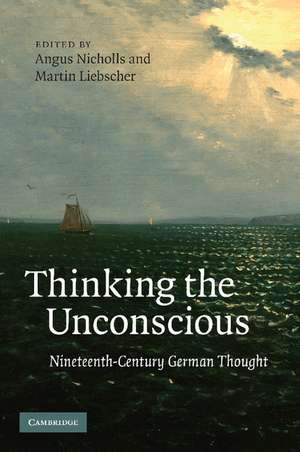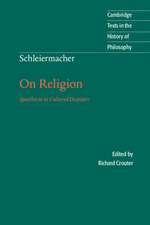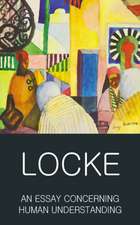Thinking the Unconscious: Nineteenth-Century German Thought
Editat de Angus Nicholls, Martin Liebscheren Limba Engleză Paperback – 28 noi 2012
| Toate formatele și edițiile | Preț | Express |
|---|---|---|
| Paperback (1) | 325.50 lei 6-8 săpt. | |
| Cambridge University Press – 28 noi 2012 | 325.50 lei 6-8 săpt. | |
| Hardback (1) | 730.55 lei 6-8 săpt. | |
| Cambridge University Press – 23 iun 2010 | 730.55 lei 6-8 săpt. |
Preț: 325.50 lei
Nou
Puncte Express: 488
Preț estimativ în valută:
62.29€ • 65.19$ • 51.84£
62.29€ • 65.19$ • 51.84£
Carte tipărită la comandă
Livrare economică 31 martie-14 aprilie
Preluare comenzi: 021 569.72.76
Specificații
ISBN-13: 9781107411760
ISBN-10: 1107411769
Pagini: 340
Ilustrații: black & white illustrations
Dimensiuni: 152 x 229 x 18 mm
Greutate: 0.45 kg
Editura: Cambridge University Press
Colecția Cambridge University Press
Locul publicării:New York, United States
ISBN-10: 1107411769
Pagini: 340
Ilustrații: black & white illustrations
Dimensiuni: 152 x 229 x 18 mm
Greutate: 0.45 kg
Editura: Cambridge University Press
Colecția Cambridge University Press
Locul publicării:New York, United States
Cuprins
Introduction: thinking the unconscious Angus Nicholls and Martin Liebscher; 1. The unconscious from the Storm and Stress to Weimar classicism: the dialectic of time and pleasure Paul Bishop; 2. The philosophical significance of Schelling's conception of the unconscious Andrew Bowie; 3. The scientific unconscious: Goethe's post-Kantian epistemology Angus Nicholls; 4. The hidden agent of the self: towards an aesthetic theory of the non-conscious in German romanticism Rüdiger Görner; 5. The real essence of human beings: Schopenhauer and the unconscious will Christopher Janaway; 6. Carl Gustav Carus and the science of the unconscious Matthew Bell; 7. Eduard von Hartmann's Philosophy of the Unconscious Sebastian Gardner; 8. Gustav Theodor Fechner and the unconscious Michael Heidelberger; 9. Friedrich Nietzsche's perspectives on the unconscious Martin Liebscher; 10. Freud and nineteenth-century philosophical sources on the unconscious Günter Gödde; Epilogue: the 'optional' unconscious Sonu Shamdasani.
Recenzii
Review of the hardback: 'From 'Discovering' to 'Thinking the Unconscious': this book offers an enlightening contribution to this still demanding and paradoxical task.' Ludger Lütkehaus, University of Freiburg
Review of the hardback: 'While the conceit that Freud discovered – or invented – the unconscious, has long been dispatched, this collection explores in fascinating detail the tangled roots of the concept in the works of Leibniz and Kant and traces its surprising ramifications through the thought of the German Romantics and their successors. The authors reveal how the early constructions of the unconscious differ from that of Freud and brilliantly trouble complainant attitudes about figures (e.g., Goethe, Nietzsche) around whom the dust of opinion has long settled.' Robert J. Richards, University of Chicago and author of The Romantic Conception of Life: Science and Philosophy in the Age of Goethe
Review of the hardback: 'Focusing on the crucible of German intellectual history in the long nineteenth century, this volume assembles expert accounts of how the concept, or complex, of the unconscious was thought and wrought before Freud. Significant new readings of canonical figures from Goethe to Nietzsche are complemented by judicious assessments of less familiar thinkers who helped shape this key term for modernity. Across the genealogical networks of philosophy, psychology, and literature, the vicissitudes of thinking the unconscious are explored with impressive erudition and an apt sense of the elusive and contested character of the subject.' Andrew Webber, University of Cambridge
Review of the hardback: '[This] is a dependable guide to particular historical examples of thinking about the unconscious in their respective contexts: that is its considerable virtue.' David Midgley, Modern Language Review
Review of the hardback: 'While the conceit that Freud discovered – or invented – the unconscious, has long been dispatched, this collection explores in fascinating detail the tangled roots of the concept in the works of Leibniz and Kant and traces its surprising ramifications through the thought of the German Romantics and their successors. The authors reveal how the early constructions of the unconscious differ from that of Freud and brilliantly trouble complainant attitudes about figures (e.g., Goethe, Nietzsche) around whom the dust of opinion has long settled.' Robert J. Richards, University of Chicago and author of The Romantic Conception of Life: Science and Philosophy in the Age of Goethe
Review of the hardback: 'Focusing on the crucible of German intellectual history in the long nineteenth century, this volume assembles expert accounts of how the concept, or complex, of the unconscious was thought and wrought before Freud. Significant new readings of canonical figures from Goethe to Nietzsche are complemented by judicious assessments of less familiar thinkers who helped shape this key term for modernity. Across the genealogical networks of philosophy, psychology, and literature, the vicissitudes of thinking the unconscious are explored with impressive erudition and an apt sense of the elusive and contested character of the subject.' Andrew Webber, University of Cambridge
Review of the hardback: '[This] is a dependable guide to particular historical examples of thinking about the unconscious in their respective contexts: that is its considerable virtue.' David Midgley, Modern Language Review
Descriere
This volume examines nineteenth-century German theories and representations of the unconscious, and the extent to which they may have influenced Freud.













